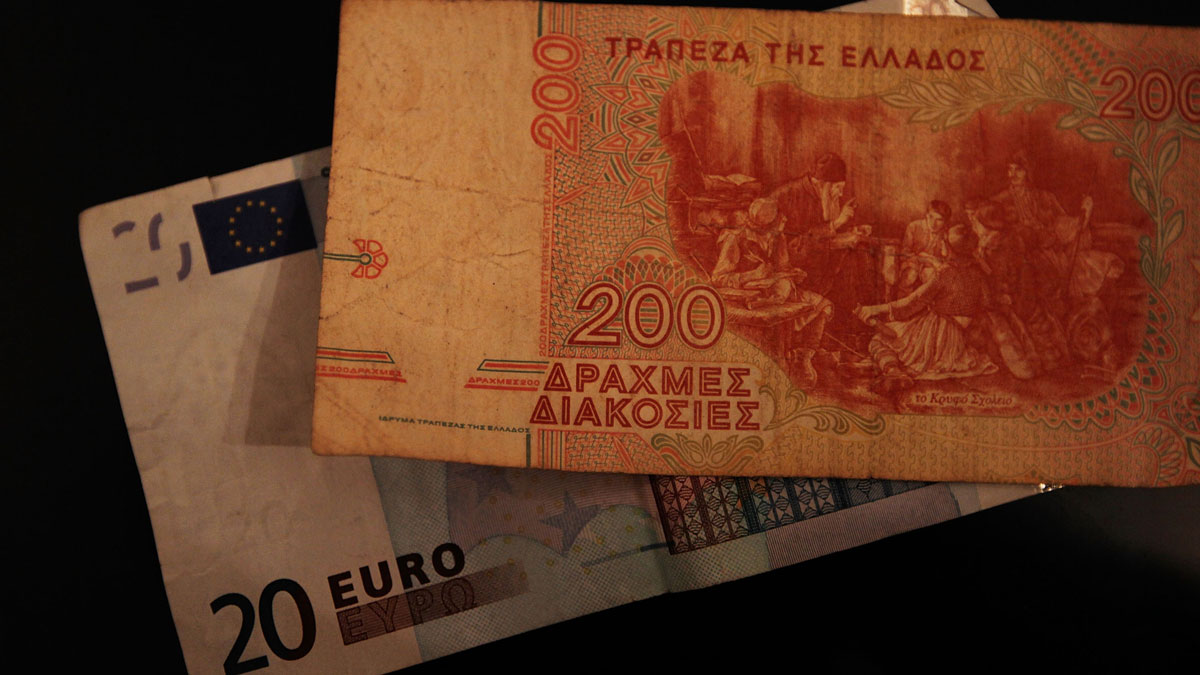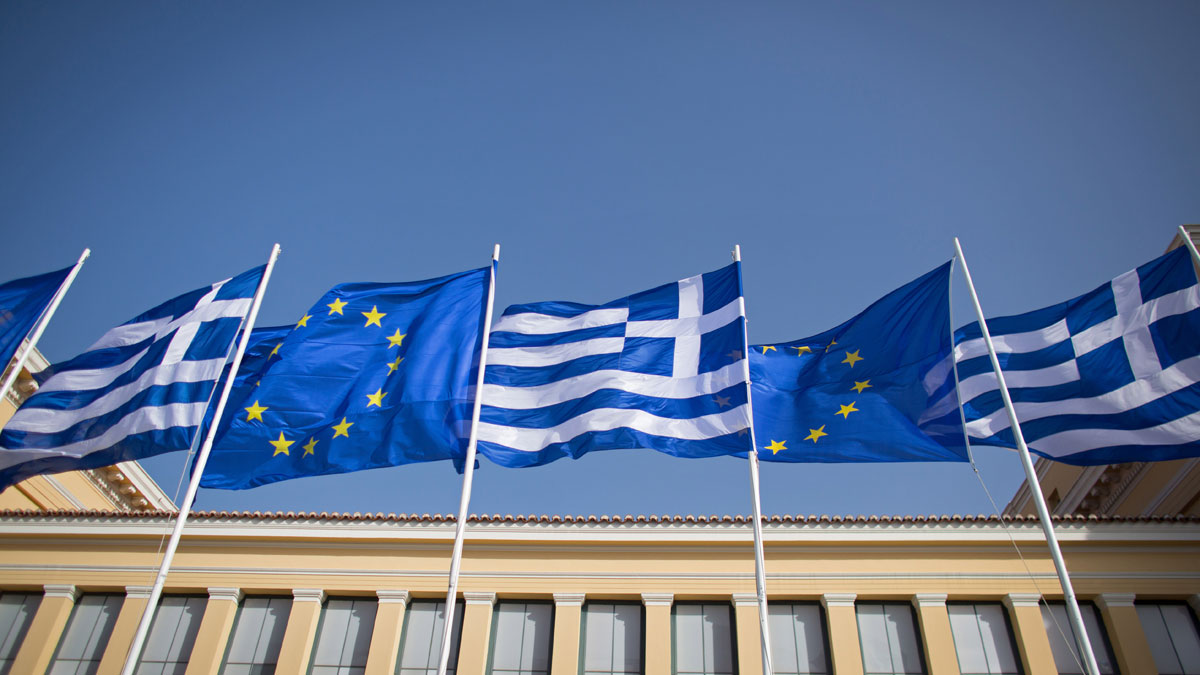Greece finally reaches deal to release €12bn bailout funds
ECB stress tests show country's banks needs €14bn to fill a capital shortfall

A free daily email with the biggest news stories of the day – and the best features from TheWeek.com
You are now subscribed
Your newsletter sign-up was successful
Grexit: ECB stay of execution ahead of disputed referendum
2 July
Beleaguered Greece has been given a stay of execution by the European Central Bank ahead of its controversial referendum at the weekend.
There had been widespread speculation that following a meeting yesterday in the wake of Greece's default, the ECB would opt to toughen the terms of its emergency assistance to Greek banks.
The Week
Escape your echo chamber. Get the facts behind the news, plus analysis from multiple perspectives.

Sign up for The Week's Free Newsletters
From our morning news briefing to a weekly Good News Newsletter, get the best of The Week delivered directly to your inbox.
From our morning news briefing to a weekly Good News Newsletter, get the best of The Week delivered directly to your inbox.
But contrary to expectation the governing council opted not to increase discounts on the government bonds and bank debt held as collateral by Greek banks against the billions in loans keeping them afloat, the Financial Times reports. If the so-called 'haircuts' had been raised, Greek banks would have had to increase the size of their reserves, something a number would have been unable to do. Many analysts said that such a move could have triggered a wave of collapses.
The ECB also voted to retain the size of its emergency credit line at €89bn. Athens has been seeking an increase of up to €6bn to improve bank liquidity and accuses the ECB of forcing the closure of Greek banks. But by not decreasing the facility, the ECB has at least kept Greece's banks alive. Unless a new bailout is agreed it is unlikely they will be able to reopen without new funding being provided by the Government, something which can only happen outside of the euro.
The future of the country within the single currency remains in doubt ahead of a referendum on Sunday, which despite speculation it may be called off due to infighting, looks set to go ahead, the Daily Telegraph reports.
Greece's government is campaigning for a No vote, which it says would force creditors to offer better terms and does not threaten its place in the single currency. Discussions on a third bailout have been postponed until after the referendum as a split emerges among eurozone leaders, The Guardian reports.
A free daily email with the biggest news stories of the day – and the best features from TheWeek.com
The Council of Europe yesterday poured scorn on the poll by saying it doesn’t meet European standards which require both clarity on the question and adequate time to debate the issues involved. The Wall Street Journal says the intervention is likely to carry little weight and does not provide a basis for a legal challenge in the European Court of Human Rights.
Grexit: day of drama fails to prevent 'default'
1 July
A dramatic day of frantic talks on the latest 'last ditch' attempt to salvage a bailout deal with Greece failed to prevent the country becoming the first in the European Union to miss a payment to the International Monetary Fund yesterday.
As expected, Alexis Tsipras's government failed to secure an extension of its existing deal with eurozone creditors and, as such, billions in bailout funding which had been held back was not released, the Financial Times reports.
The cash-strapped country was therefore unable to meet a €1.6bn payment to the IMF, which Slate magazine notes puts it in an ignominious club of states currently 'in arrears' that includes Zimbabwe, Cuba and Sudan.
According to the Daily Telegraph, the country may not even be given the typical 30-day 'grace period' offered to most debtors. Despite a missed payment to the IMF not being classed as a technical 'default', ratings agency Standard and Poor's has already moved to downgrade Greek debt.
The miss had been expected ever since talks collapsed at the weekend following the announcement of a referendum in Greece on the creditor proposals, but there were hopes it might be avoided at the last minute after the Greek government tabled fresh requests for an extension to bridge to a brand new €29bn rescue plan drawing on emergency funds under the European Stability Mechanism.
Any hopes of extending the existing deal were snuffed out almost immediately just hours before it expired. Talks over the new proposal will continue in a meeting of eurozone finance ministers today.
Hopes are not high of a resolution before Sunday's vote, with German Chancellor Angela Merkel quoted in The Guardian saying negotiations about "anything new" will not take place until "the referendum, as planned, takes place".
Perhaps the best that can now be hoped for by those trying to preserve Greece's membership of the euro is that the core elements of a deal can be agreed in principle, allowing the Greek government to change its recommendation to the Greek people to vote 'yes'. That may be critical, as The Independent reports current opinion polls are pointing to a 'no' vote, which leaders have insisted would precipitate a euro exit.
The gap is narrowing, though, amid signs of strain resulting from capital controls on banks. Worse could yet be to come: the Financial Times warns that with Greece now not party to a bailout deal, the European Central Bank may toughen the terms of its emergency assistance for the country’s banks. This could push weaker lenders "over the edge".
Grexit: how will Greece vote in bailout referendum?
30 June
The stakes could not be higher ahead of the crucial bailout referendum in Greece this weekend, which is likely to determine whether Greece is ejected from the euro.
In its editorial today – the day Greece is set to miss a €1.6bn payment to the International Monetary Fund, which could set the country on the path to Grexit – The Independent says "an entire continent is at stake". European Commission president Jean-Claude Juncker yesterday urged Greeks to vote 'yes' on Sunday, in what they present as a ballot on remaining in the euro, and perhaps even the European Union.
The big guns are out on the left, too. Nobel Prize winning economists Joseph Stiglitz and Paul Krugman have penned pieces for the Toronto-based Globe and Mail and the New York Times respectively, imploring Greeks to reject an ultimatum which they say amounts to an attempt to oust the leftist Syriza government.
How Greeks actually will vote is less clear. The Daily Telegraph has published the results of polls carried out for two Greek newspapers before the referendum was announced, which suggest that most now back a deal with creditors. A poll for Proto Thema newspaper found 57 per cent said they believed Greece should make a deal, while 29 per cent were against it. Separate research for To Vima newspaper found 47 per cent in favour and 33 per cent against.
The strength of anti-austerity feeling has been growing, though, especially among poorer citizens who have been hit hardest by a brutal economic decline and unemployment currently running above 25 per cent. Sky News says some 17,000 took to the streets on Monday backing Prime Minister Alexis Tsipras's call for a 'no' vote.
The question that will actually be put to the population was revealed yesterday afternoon and was immediately decried by the Independent as "long and vague". The BBC says the question, which asks only whether the latest 'plan of agreement' should be accepted, makes "(almost) no sense".
Whatever its outcome, the consequences of the referendum will be complex. If the current bailout expires today, there will technically be no package left to accept – and Tsipras has hinted that his government would resign. That would probably result in the extensions of capital controls while a new solution is found.
A 'no' vote could mean the end of the euro in Greece, but there is no provision for this in European law and the Greek government has vowed to take legal action to prevent the country being forcibly removed.
Greek crisis: default imminent, but euro future unclear
29 June
Greece is set to default on a package of rolled-up debt repayments to one of its major international creditors tomorrow, as talks finally collapsed irrevocably over the weekend.
The fatal blow was struck late on Friday, when Greek Prime Minister Alexis Tsipras called a snap referendum on the reforms being demanded in return for a continuation of its €240bn bailout deal. Greeks will go to the polls on Sunday, five days after a €1.6bn payment to the IMF payment is due and, more crucially, the current agreement expires tomorrow.
In the short term the Greek government has been forced to impose capital controls as queues lengthen at cash points around the country. Greek banks, which the Financial Times says have already seen their deposit base shrink by around €100bn as the crisis has escalated in recent weeks, will be closed all week, while a €60-a-day limit has been imposed on cash withdrawals. The Athens stock market is also closed today.
Markets in Europe opened sharply lower on Monday morning. In Frankfurt and Paris shares plummeted more than 4 per cent within minutes of the resumption, with banking stocks leading the downward spiral. Further afield Asian shares all ended in the red overnight, with China's Shanghai composite down more than 3 per cent.
The view among commentators seems to be that exit from the euro is now inevitable. The FT's Wolfgang Munchau narrows the prospects to either exit from the single currency, or a large yes vote that would prompt the resignation of the Greek government and "indefinite capital controls" while a new bailout is sought.
In truth we are in uncharted territory. As a blog from the legal department of Maastricht University makes clear there is no provision in existing treaties for a country to exit the euro, only to exit the European Union altogether. The single currency was meant to be irreversible, which perhaps explains why Europe has not given up on finding a solution.
The European Central Bank has, crucially, only frozen the emergency credit line to the country. This means, as the FT states, that while banks can no longer pay depositors "they do not go bust". References to the IMF debt repayment are using the word "arrears" rather than "default", with a new deadline of 20 July when a repayment is due to the ECB being mooted as the next crunch point.
The European Commission has also published "for the information of the Greek people" the unfinished package it was hoping to resume negotiating on Saturday.
In the meantime, America is pushing European leaders to strive for a solution to keep Greece in the Eurozone, the Daily Telegraph reports. The paper says a statement from US treasury secretary Jack Lew urged all sides to continue to seek a solution, including offering debt relief for Greece, a key demand that the creditors have so far refused.
Greek crisis: debt wrangling to go to the wire
25 June
Another day, another round of Greek bailout talks which fail to produce a deal. Time is now running out to get an agreement which can be ratified by state legislatures on all sides, before the current €240bn bailout expires and a €1.6bn payment falls due to creditors on Tuesday.
Hopes had been high that the second round of negotiations between the so-called Eurogroup of finance ministers from across the single currency bloc would break the impasse last night, after "constructive" proposals were submitted by Greece on Monday. Instead a five-page rejoinder was issued by the International Monetary Fund and promptly leaked to the press, demanding, according to The Guardian, that Greece up its offer of €8bn in spending reductions to around €11bn.
An analysis of the document carried out by the Financial Times reveals the IMF has told Greece it must accelerate its pension reforms to achieve savings of €1.8bn, or 1 per cent of GDP, by bringing forward by three years a staged increase in state pension age to 67, and to remove the 'solidarity grant' top-up for poorer pensioners three years early in 2017. Greece had originally pledged to save 0.4 per cent of GDP from the pension bill next year and has repeatedly asserted that decreasing the amounts paid is a 'red line' it will not cross.
Elsewhere measures to raise funds through taxes, for example through a one-off 12 per cent tax on corporate profits of more than €500,000 and an increase in the corporation tax rate from 26 per cent to 29 per cent, have also either been removed or restricted to focus on government spending cuts in areas such as defence.
Talks with Eurogroup ministers are continuing from around lunchtime today ahead of a European Council meeting of country leaders, which will go on into Friday when any final deal will be agreed. But that is not the end of the story.
Greece, along with other Eurozone parliaments, most notably Germany, must get the deal approved in parliament, which The New York Times notes is " not certain in either case". The paper quotes Norbert Rottgen, a deputy for German premier Angela Merkel’s Christian Democrats, as saying that despite a "damaged mood" the German Parliament would vote for any new Greek deal.
The main issue is time, given that a deal reached on Friday would leave just three days before the current bailout expires. Some are confident, however. The Independent's Jim Armitage says the current intransigence shown by all is "crucial to convince electorates on all sides that their interests are being fought for" but "masks an overwhelming will to get a deal done". He believes a compromise will inevitably be struck.
Greek crisis: Tsipras faces fight on two fronts
24 June
As eurozone finance ministers begin fresh talks aimed at breaking the Greek impasse, Prime Minister Alexis Tsipras is preparing for a bruising domestic battle to win support for any new deal to keep his country in the single currency.
Attention has been focused on Greece's creditors, with The Guardian repeating the suggestion that International Monetary Fund chief Christine Lagarde is not satisfied with revised reform proposals submitted on Monday. But comments from Greek ministers suggest that Tsipras's concessions already go too far for a government that pledged to break the stranglehold of austerity when it was elected in January.
According to the Financial Times, concerns over whether Greece can secure parliamentary approval have prompted Berlin to insist that any deal is ratified at home before €7.2bn in locked bailout funds can be released. A deal is not possible before Thursday's meeting of European leaders, giving Greece just four days to get parliamentary assent before a critical €1.6bn payment to the IMF falls due next Tuesday.
The minority coalition partner Independent Greeks (Anel) has said it would only back a deal that included a write-off of some of the country's €320bn debt, a move now considered unlikely. It added that it would not back plans to raise VAT, a key plank of the government's €7.9bn reform plan.
Some within Syriza have also spoken out. The Daily Telegraph reports that one government MP, Yannis Michelogiannakis, branded the proposals a "tombstone" around the country's neck during an interview on Greek television. With only a 12-seat majority, the government may need the backing of opposition parties to avoid a collapse.
As the latest two-day talks get underway, the European Central Bank has continued to extend its emergency credit line to Greek banks, which is now being reviewed daily. According to The Independent, the ceiling on the Emergency Liquidity Assistance facility was upped by €1bn on Tuesday, the fourth time in six working days it has been increased.
The European Commission, essentially a mediator in the dispute, has also pledged to provide €35bn in emergency aid to Greece if it can secure a deal with creditors.
-
 History-making moments of Super Bowl halftime shows past
History-making moments of Super Bowl halftime shows pastin depth From Prince to Gloria Estefan, the shows have been filled with memorable events
-
 The Washington Post is reshaping its newsroom by laying off hundreds
The Washington Post is reshaping its newsroom by laying off hundredsIn the Spotlight More than 300 journalists were reportedly let go
-
 Quiet divorces are sneaking up on older couples
Quiet divorces are sneaking up on older couplesThe explainer Checking out; not blowing up
-
 Majority of Greeks regret joining euro
Majority of Greeks regret joining euroSpeed Read Fifty-three per cent say it was 'wrong' to join single currency - and feeling is strongest among the young
-
 US stock markets fall after Greek vote
US stock markets fall after Greek voteSpeed Read Wall Street slide mirrors falls in Asia and Europe as global 'Grexit' jitters take hold
-
 'Leap' second: how much was it worth?
'Leap' second: how much was it worth?In Depth During yesterday's extra second, Apple earned about twice the average UK weekly salary
-
 Greek crisis: a case of history repeating itself
Greek crisis: a case of history repeating itselfIn Depth If Greece leaves the euro, it won't be the first monetary exit for the Hellenic Republic
-
 Greece crisis: has bailout ended threat of Grexit?
Greece crisis: has bailout ended threat of Grexit?In Depth Economic targets remain ambitious and the political situation is far from settled